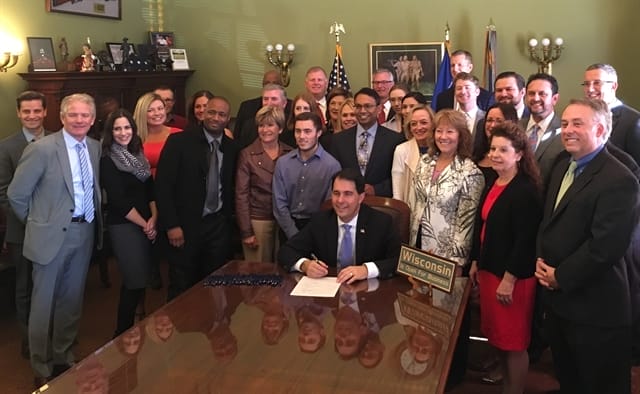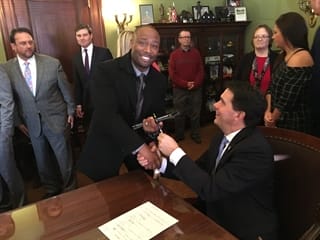Several regulations removed from the books, freeing professionals from onerous and unneeded requirements
Madison — Barbers, cosmetologists and other beauty professionals will now be able to practice their professions with fewer regulatory burdens after Gov. Scott Walker signed into law Monday reforms that will reduce some of the professions’ complicated and costly licensing requirements.
The urgent need for reform was evidenced by research and reporting conducted this year by the Badger Institute. “Government’s love for licensure,” a special report published by the institute in April, found that licensing requirements for barbers, cosmetologists, manicurists, aestheticians and other professionals make it more expensive — and sometimes prohibitive — for them to serve customers and for newcomers to start careers in Wisconsin.
Since then, the Badger Institute has reported on the burdensome regulatory obstacles faced by Green Bay barber Albert Walker, Iron River salon owner Krissy Hudack, student entrepreneur Samuel Haack and aspiring Milwaukee cosmetologist Cassie Mrotek.
The reforms signed by the governor remove some key professional licensing requirements that prohibited entry into beauty-related professions or overly restricted their practices. Occupational licenses in many cases are little more than government permission slips to work, establishing requirements that generally reduce competition, stifle innovation and drive up prices for consumers.
Wisconsin’s complex licensing system affects an estimated 207 professions, ranging from auctioneers to septic system installers, and requires extensive and expensive education and training.
To receive a cosmetology license in Wisconsin, for example, the state Department of Safety and Professional Services requires applicants to have at least 1,550 training hours at a state-licensed school or to complete an apprenticeship with at least 3,712 hours of practical training with at least 28 hours of instruction — at costs that can exceed $20,000. Applicants also must pass a state exam.
While the reforms do not eliminate the licensing requirement for barbers and cosmetologists, they do make a number of changes, including:
• Removing separate licensing requirements for barbers and cosmetologists who want to become managers.
• Eliminating continuing education requirements for barbers, cosmetologists, aestheticians, electrologists and manicurists.
• Allowing professionals from other states with 4,000 hours of experience and a clean business track record to more easily obtain a reciprocal license.
• Allowing those professionals to provide services outside of salons or shops to all customers, not just to homebound or institutionalized clients (which is current law).
• Allowing those professionals to provide instruction in their fields without obtaining an additional license.
“Gov. Walker championed occupational licensing reform in his budget proposal because he wants to remove barriers to work and make it easier for people to pursue their dreams,” spokesman Tom Evenson wrote in an email to the Badger Institute. “These bills remove costly government requirements, and it’s a big win for anyone pursuing a career in cosmetology and barbering.”
“I feel like I’ve been in a deep pit that I didn’t dig, and now someone has thrown me a rope,” said Albert Walker, who attended the bill signing ceremony at the state Capitol. “These bills will clear many of the obstacles that make it hard for people in my profession to succeed.”
Cosmetologists who move to Wisconsin from other states will no longer face a burdensome patchwork of rules that they must navigate before receiving a reciprocal license. Mrotek moved to Milwaukee from Florida, where she had completed that state’s required 1,200 training hours and obtained a beauty school certificate, which cost $16,000. But after over a year of trying, she still could not get licensed in Wisconsin.
“It’s just strange,’’ she told the Badger Institute this spring. “What makes it vary from state to state? And if I move to a different state, am I going to have to go through all this again? I’m doing hair, not saving lives,’’ she said.
Entrepreneur Haack, who formed Trimm Haircuts with a fellow University of Wisconsin-Madison student to offer a new web-based platform providing in-home or on-site haircuts through a mobile app, said the bills signed Monday “mean the world.”
“It helps level the playing field for people like us so we can compete on an even footing with the corporate chains and franchises,’’ he said, noting that the system is set up to favor those operations.
In April, Hudack and Badger Institute President Mike Nichols testified on behalf of these measures before the Wisconsin Senate Committee on Public Benefits, Licensing & State-Federal Relations.
While the reforms are a step forward, they are just a start as the number of licensed professions has exploded in recent decades, creating a Byzantine collection of licensing requirements that are often inconsistent, illogical and anti-competitive.
The state requirement of 1,550 training hours for cosmetologists is a perfect example of the arbitrary nature of many licenses. By contrast, life-saving emergency medical technicians are only required to have 180 hours of training in Wisconsin.
Gov. Walker, meanwhile, has proposed an Occupational Licensing Review Council to review all of the state’s licensing requirements — including those for teachers — to address a system that at the beginning of the last century licensed only 14 professions.
A study by the Wisconsin Institute for Law & Liberty estimates that about 440,000 Wisconsin workers now hold some sort of professional certification required by the state, including health professionals, juvenile martial arts instructors, firewood sellers and Christmas tree sellers. And that may be an underestimate, it says.
“While there may be justification for a few state licenses based on public safety, most are established by existing professionals to fence out competitors,” Nichols said. “At the Badger Institute, we will continue to shine a light on state regulations that hurt consumers and hinder individual success.”






